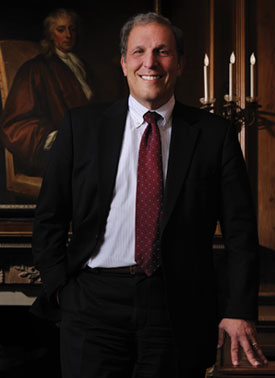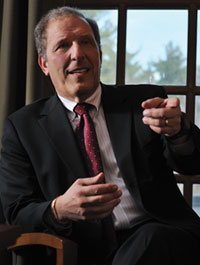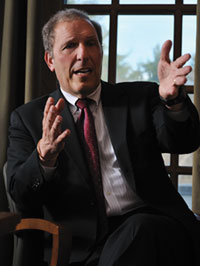Small Steps Yield Big Impact
Lisa Leslie Henderson writer
Peter Baker photographer
Somewhere along every road that leads into Wellesley there are small green signs with arrows that point toward a hotbed of entrepreneurial activity: Babson College. While its  quintessential New England campus suggests tradition, let’s be clear: Babson’s purpose is nothing short of changing the world. To do so, the entire academic community is learning to think and act differently, taking lessons from successful serial entrepreneurs.
quintessential New England campus suggests tradition, let’s be clear: Babson’s purpose is nothing short of changing the world. To do so, the entire academic community is learning to think and act differently, taking lessons from successful serial entrepreneurs.
Babson College President Leonard Schlesinger wholeheartedly believes that to operate successfully in today’s fast-moving, global, and highly unpredictable world, a broader vision for business and updated decision making logic are necessary. In his latest book, Just Start: Take Action, Embrace Uncertainty, Create the Future, he and his co-writers, Charles F. Kiefer and Paul B. Brown, suggest that we can learn much of what we need to know from serial entrepreneurs. What’s more, these insights can be successfully applied to any stage business, not just start-ups and, beyond business, to almost any situation we find ourselves in. Intrigued? We were, too. Here’s what we learned when we talked with President Schlesinger in his office.
WellesleyWeston Magazine: We often attribute serial entrepreneurs’ success to rare traits that escape the rest of us—such as an extraordinary risk tolerance or an ability to magically read the marketplace. What have you found to be the secret to serial entrepreneurs’ success?
President Schlesinger: Contrary to popular conception, serial entrepreneurs are not a unique heroic species, but when you study the characteristics of successful serial entrepreneurs, you find that at their core they operate quite differently from the rest of us.
Serial entrepreneurs believe that they can shape the future and they are comfortable taking action toward that end in environments where many of us might feel paralyzed by uncertainty. Entrepreneurs don’t have x-ray vision or extraordinary risk tolerance—in fact, they generally take very small risks, or figure out a way to syndicate risk so that they take little to none at all; what they do have is a different approach to making decisions.
Entrepreneurial leaders do not operate in a linear, planned, and risk-oriented manner. Nor do they buy into the idea that the only way they can ever move forward is to study something until they know absolutely everything about it. Serial entrepreneurs create the future through action and experimentation, a process we call CreAction.
WWM: What distinguishes CreAction from traditional analytical thinking?
Schlesinger: All of us have been taught a pattern of analytical thinking and acting that is based on the assumption that the future is going to behave in a way that is similar to the present and the immediate past. It involves inferring and extrapolating, often using complex analytic methods. These methods are quite robust in predictable environments, but in situations in which there is high uncertainty, where the future is quite likely to be different than the past, we have found that this prediction-based approach is almost a worthless endeavor.
 CreAction reasoning is a complementary way of making decisions that is better suited when the future is basically unpredictable. Instead of thinking your way into a new way of acting, which is at the heart of using traditional prediction methodology, in CreAction, you act your way into a new way of thinking. In the face of uncertainty, we make the outrageously bold claim that action trumps analysis.
CreAction reasoning is a complementary way of making decisions that is better suited when the future is basically unpredictable. Instead of thinking your way into a new way of acting, which is at the heart of using traditional prediction methodology, in CreAction, you act your way into a new way of thinking. In the face of uncertainty, we make the outrageously bold claim that action trumps analysis.
WWM: Any action trumps analysis?
Schlesinger: No, smart action trumps analysis. Entrepreneurial leaders don’t overthink, worrying about all the possible outcomes of a situation, outcomes that may be impossible to predict. But they don’t act impulsively either. They consciously and deliberately take small, smart steps toward their goal. After each step, they evaluate what they have learned.
With each stride in this “ACT>LEARN>REPEAT” loop, serial entrepreneurs create evidence for or against their decision. Rather than getting bogged down in the big question, “What are we going to do?” entrepreneurial leaders continually ask the smaller question, “What are we going to do next?” That difference allows them to act their way into accurately answering the bigger question over time without being paralyzed by the question itself.
WWM: How is CreAction related to intuition?
Schlesinger: CreAction has nothing to do with classic intuition. It is not making decisions based upon a gut feeling; it is making decisions based upon learning from smart action.
WWM: Does CreAction always preempt prediction? Is there ever a role for analysis?
Schlesinger: CreAction complements prediction. When prediction makes sense, predict. When it doesn’t, try CreAction. As we encounter new situations we will invariably bounce back and forth between the two, a process we call cognitive ambidexterity.
WWM: What comprises smart action?
Schlesinger: There are a few basic tenets of smart action. First, desire is essential. Make sure that what you are trying to do is something that you really care about. If not, forget it. Second, get started quickly with the means at hand. Focus on what you have, not what you don’t have, remembering that success is not about getting financed, it’s about getting started and taking small steps toward your goal to see what happens. Third, build off what you learn. Evaluate your results; if you like what you have obtained, take more steps toward your goal. Fourth, invest only what you can afford—and are willing to lose. Fifth, don’t go it alone. Make the most of the people around you.
 WWM: Does smart action redefine our notion of failure?
WWM: Does smart action redefine our notion of failure?
Schlesinger: Smart action has failure written all over it, but it is the kind of failure from which you can create value. I shy away from the word failure because it is so loaded. Call it learning, or intentional iteration, or a pivot. The bottom line is that this entrepreneurial approach allows you to act sooner and at a lower cost, so that you can make progress toward your goal. With each iteration you gain knowledge that perhaps no one else has, which can improve the probability of success.
WWM: How does Babson teach CreAction?
Schlesinger: CreAction is one component of our trademarked methodology, Entrepreneurial Thought and Action (ETA), through which we develop visionary leaders who shape social and economic opportunity. I emphasize social and economic opportunity because at Babson we believe that it is no longer adequate for businesses to pursue profit maximization and shareholder value alone. We seek to develop leaders with a commitment to simultaneously managing social, environmental, and economic value creation, rather than sequentially.
We also understand that the most powerful way to teach entrepreneurial leadership is to live it, so we nurture a 24/7 living laboratory here on campus. Not satisfied with being only a repository of knowledge, we are creators and conveners of new knowledge about entrepreneurship, partnering with scholars, researchers, managers, business owners, current students, and alumni to continuously move the field forward. Because we ourselves are entrepreneurial we can train our students to be entrepreneurial.
All of the learning that takes place within the traditional academic disciplines at Babson is infused with the ETA philosophy. Through our co-curricular offerings and the real-world experiences we make available, our students’ learning extends beyond their 14 hours of class time, to include the remaining 154 hours in their week—and their summers. Students have multiple opportunities to share what they are learning with others, teaching entrepreneurship to high school students in Ghana and Rwanda during the summer and to inner-city children through our Lemonade Day program. It makes for a really interesting place.
WWM: ETA seems like an approach to life, not just an approach to business.
Schlesinger: Precisely. It’s a democratization of entrepreneurship and a broadening of the context. ETA is not just about fostering start-ups. It’s applicable to managing, sustaining, and growing all kinds of organizations. When you consider that the half-life of Fortune 25 companies is a decade, you realize how vital nurturing innovation in established companies is for the health of our economy. Similarly, the vast majority of wealth outside of developed economies is in family-owned businesses. This approach is helping build legacies of social and economic wealth that can remain viable across several generations.
 WWM: How did you use the fundamentals of ETA to write Just Start?
WWM: How did you use the fundamentals of ETA to write Just Start?
Schlesinger: Our objective with Just Start was to get the debate about the benefits of entrepreneurial leadership started. It’s a vitally important debate—we believe it can change the world.
The book began two years ago as a series of talks from which our original draft of the book, Action Trumps Everything, came to be. We wanted to continue to test our hypothesis across a broader audience, so we gave an electronic version of the book away for free and invited people everywhere into the conversation. Hundreds upon hundreds of people became involved, far beyond anything we expected. Through this process we refined our ideas and our language to the point where we were happy with the elegance of it. Harvard Business Press has just published that new and improved version under the title, Just Start.
WWM: You’ve had quite a career: the first generation in your family to go to college, twenty years teaching at Harvard Business School, vice chairman and chief operating officer at Limited Brands, co-author of nine books, and now the 12th president of Babson College. You recently received the Entrepreneurial Leadership Award for being the nation’s Most Entrepreneurial University President. Looking back, how have the principles outlined in Just Start helped you in your career?
Schlesinger: Although I didn’t know it at the time, I have instinctively made decisions using smart action throughout my career. As we have studied serial entrepreneurs’ decision making, I have been quite delighted to see that this logic was not derived from me, but from a portfolio of people that have actually been quite successful in life.
The bottom line is this: anyone can learn to operate like serial entrepreneurs. It’s a relearning, actually, as we all intuitively used CreAction to learn to walk, talk, and get our basic needs met as young children. Smart action empowers each of us to act now to create what we want and gives us a way to attack seemingly insurmountable problems, whether that is losing weight, finding a job, or perhaps, especially, changing the world.
Just Start is available from Harvard Bussiness Press. To learn more about Babson’s broader ETA program, see The New Entrepreneurial Leader, (Berrett-Koehler, 2011), co-written by Wellesley author and Babson professor Dana Greenberg.


recent comments